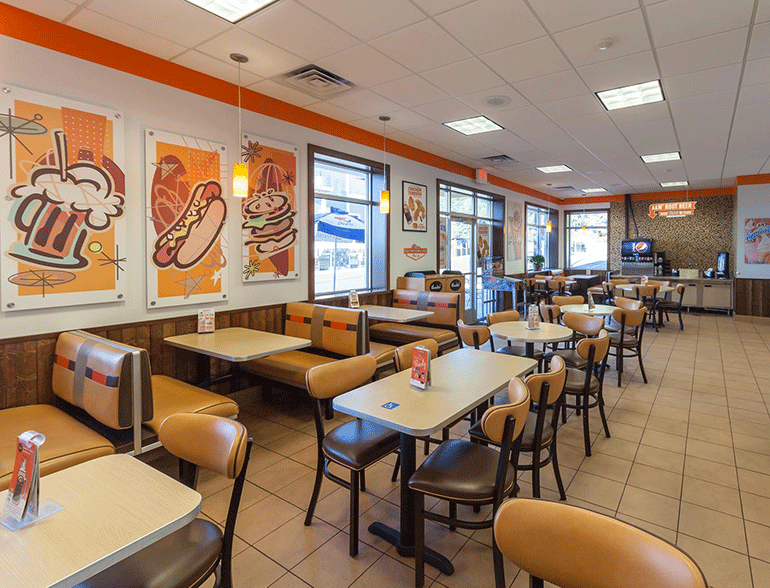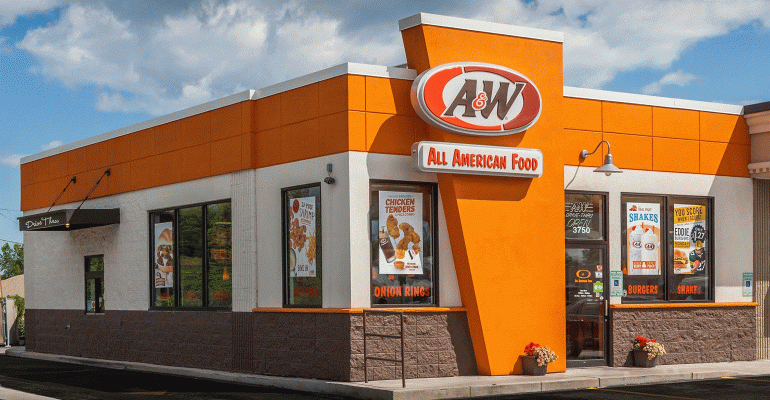Once struggling quick-service chain expects net new unit growth for the first time in a decade
A&W Restaurants is quietly doing something it hasn’t done for a decade: Open new restaurants.
The Lexington, Ky.-based quick-service chain operates 634 locations in the U.S., two more restaurants than it did at the end of 2016. And with another 11 locations under development, A&W said it will finish the year having opened more units than it closed for the first time since before the recession.
The reason for the newfound growth is simple: Franchisees are generating positive sales.
A&W chief operating officer Paul Martino said the average franchisee of a standalone restaurant has seen 30-percent same-store sales growth since 2011, when former parent Yum! Brands Inc. sold A&W to its franchisees.
Systemwide, including the chain’s co-branded locations, A&W’s same-store sales have risen 22 percent over that time, Martino said.
“Happy franchisees make it very easy to sell more franchisees,” he said.
Yum acquired A&W and its sister chain, Long John Silver’s, in 2002, seeking to use the two concepts as part of a co-branding initiative. Yum spent the next several years working the two concepts into its three other chains —KFC, Taco Bell and Pizza Hut.
But co-branding didn’t become the panacea Yum hoped it would. And with A&W and Long John Silver’s struggling and closing restaurants, Yum sold the chains in separate deals. A partnership between a large international franchisee and the company’s U.S. franchisee association acquired A&W in 2011, for terms that were not disclosed.
Even after the acquisition, A&W shed dozens of restaurants. The chain had 740 U.S. locations at the end of 2012, according to NRN Top 200 data, and lost more than 100 units by the end of 2016.
Most of the restaurants that closed were co-branded locations whose operators decided to focus on one concept, Martino said.
“The unit decline over the first couple of years was almost all co-brands,” he said. “Co-branding was a difficult beast, from an execution standpoint.”
A&W has opened seven new restaurants this year and has 11 more locations under development. Martino said the company expects to finish the year with 20 new restaurants.

International growth is even stronger. A&W has opened 22 locations overseas, mainly in Thailand, Indonesia and Malaysia, and now has 328 international units.
According to Martino, the split from Yum has proven beneficial for A&W because the brand is on its own, rather than hidden in a large corporation. Franchisee ownership has also helped by giving franchise operators more confidence in the brand and management decisions.
“Franchisees feel confident with the leadership,” Martino said. “They feel confident in the business. They’re seeing same-store sales growth. That all works together in our franchise community being more and more confident with what’s happening with the brand.”
Every decision management makes goes through its board, which is filled with franchisees.
“There are some franchisees on the board with 100 restaurants,” Martino said. “And there are a couple of board members who leave the meeting and go work in their restaurant. They’re not in an ivory tower. They’re working the grill or the cash register. There’s no better way to stay in tune with the effectiveness of products and brand promotions.”
A&W’s board and management have successfully found new ways to generate sales. In 2013, A&W introduced new hand-breaded chicken tenders that boosted chicken sales by 50 percent, even though the item is more complicated to make. The chain also introduced a Mini Polar Swirl soft-serve ice cream dessert whose sales grew 30 percent.
The chain also got back to “blocking and tackling,” Martino said. He and Kevin Bazner, A&W’s president and CEO, have visited hundreds of restaurants since 2011, “shaking hands, kissing babies and listening to the voice of the franchisee.”
And operators are sprucing up restaurants, which is generating stronger sales.
“All decisions are made in unison,” Martino said. “We don’t always agree. But we almost unilaterally walk out of meetings aligned about what steps we are going to take going forward.”

